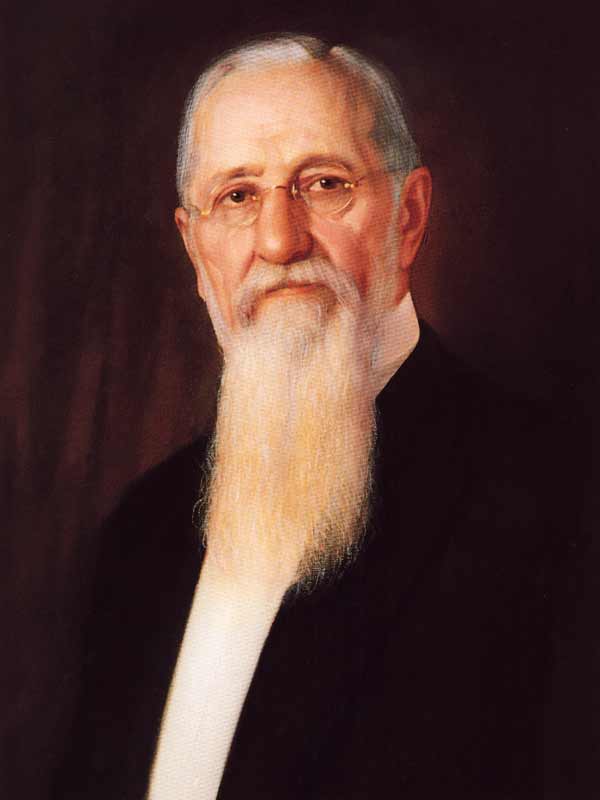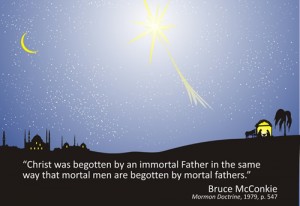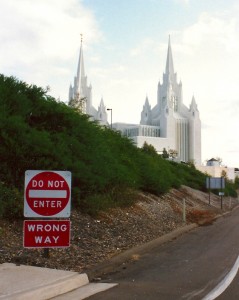Podcast: Play in new window | Download (Duration: 14:01 — 12.8MB)
Subscribe: Apple Podcasts | RSS
I was just paging through an old book I found at a used bookstore. It’s titled Principles of the Gospel, published in 1961 by the Corporation of the President of the Church of Jesus Christ of Latter-day Saints, and contains an opening note to “Brethren” of the armed services from the First Presidency (David O. McKay, J. Reuben Clark, and Henry S. Moyle). The book contains brief explanations of various Mormon doctrines, “Based Largely Upon the Compendium (Richards-Little) With Excerpts From Other Writings.”
Under the heading “Godhead” and sub-heading “1. Father as Literal Parent,” the book states,
“Jesus Christ is the Son of Elohim both as spiritual and bodily offspring; that is to say, Elohim is literally the Father of the spirit of Jesus Christ and also of the body in which Jesus Christ performed His missions in the flesh, and which body died on the cross and was afterward taken up by the process of resurrection, and is now the immortalized tabernacle of the eternal spirit of our Lord and Savior. No extended explanation of the title ‘Son of God’ as applied to Jesus Christ appears necessary.” (196)
What do you think it means that, according to Mormonism, Jesus is the literal “bodily offspring” of God the Father?
 This is how sixth Mormon President Joseph F. Smith would answer this question:
This is how sixth Mormon President Joseph F. Smith would answer this question:
“You all know that your fathers are indeed your fathers and that your mothers are indeed your mothers you all know that don’t you? You cannot deny it. Now, we are told in scriptures that Jesus Christ is the only begotten Son of God in the flesh. Well, now for the benefit of the older ones, how are children begotten? I answer just as Jesus Christ was begotten of his father. The Christian denominations believe that Christ was begotten not of God but of the spirit that overshadowed his mother. This is nonsense. Why will not the world receive the truth? Why will they not believe the Father when he says that Jesus Christ is His only begotten Son? Why will they try to explain this truth away and make mystery of it?
“Now if God is a man, a glorious perfected man-that is, perfect in all his glorious attributes, and infinite in power, there never will come a time when God the Father will not have power to extend His dominion and His Glory. He is the maker of Heaven and the Earth, on which we dwell, for He made this earth by his word and by his power. How did he make it? He called the elements that are invisible to our eyes. He formed the earth on which we dwell, and has formed millions of worlds, and they are peopled with his children, for there is no end to his dominions and the worlds he has created cannot be numbered unto man.
“Now, little boys and girls, when you are confronted by infidels in the world who know nothing of how Christ was begotten, you can say he was born just as the infidel was begotten and born, so was Christ begotten by his Father, who is also our Father-the Father of our spirits-and he was born of his mother Mary.
“The difference between Jesus Christ and other men is this: Our fathers in the flesh are mortal men, who are subject unto death; but the Father of Jesus Christ in the flesh is the God of Heaven. Therefore Jesus, as he declared, received the power of life from his Father and was never subject unto death but had life in himself as his father had life in himself. Because of this power he overcame death and the grave and became master of the resurrection and the means of salvation to us all.
“Shall we as Latter-day Saints deny the truth and then claim that God made man in his likeness in the beginning? Shall we come under the impression that God possesses the power of creation, and yet did not literally create? He is not without his companion any more than I am without my companion, the mother of my children.
 “These are truths and I wish they could be instilled into the hearts of these little children so that they will not be tossed about by every wind of doctrine and be confused by the teachers of atheism. Now, by and by you will be able to understand this far better than you can today. Some of us grandparents find it difficult to conceive the truth we want to think of something marvelous. We want to try to make it appear that God does not do things in the right way, or that he has another way of doing things than what we know, we must come down to the simple fact that God Almighty was the Father of His Son Jesus Christ. Mary, the virgin girl, who had never known mortal man, was his mother. God by her begot His son Jesus Christ, and He was born into the world with power and intelligence like that of His Father…
“These are truths and I wish they could be instilled into the hearts of these little children so that they will not be tossed about by every wind of doctrine and be confused by the teachers of atheism. Now, by and by you will be able to understand this far better than you can today. Some of us grandparents find it difficult to conceive the truth we want to think of something marvelous. We want to try to make it appear that God does not do things in the right way, or that he has another way of doing things than what we know, we must come down to the simple fact that God Almighty was the Father of His Son Jesus Christ. Mary, the virgin girl, who had never known mortal man, was his mother. God by her begot His son Jesus Christ, and He was born into the world with power and intelligence like that of His Father…
“Now, my little friends, I will repeat again in words as simple as I can, and you talk to your parents about it, that God, the Eternal Father is literally the father of Jesus Christ.
“Mary was married to Joseph for time. No man could take her for eternity because she belonged to the Father of her divine Son. In the revelation that has come thru Joseph Smith, we learn that it is the eternal purpose of God that man and woman should be joined together by the power of God here on earth for time and eternity.
“If a man and woman should be joined together who are incompatible to each other it would be a mercy to them to be separated that they might have a chance to find other spirits that will be congenial to them. We may bind on earth and it will be bound in Heaven, and loose on earth and it will be loosed in Heaven. I would like teachers of the Sunday school to take these simple facts and teach them to the children so that they may understand the truth, that their faith may be founded in fact and in truth; for nothing that is not built upon truth will stand. That which is false will fall. Only that which is based upon God’s truth will endure.
“Now, my brothers and sisters and the Sunday school workers, we want you to teach the children the truth and nothing but the truth.” (Messages of the First Presidency of The Church of Jesus Christ of Latter-day Saints, 4:327ff. Read the entire sermon at the MRM website.)
President Smith indicated that the LDS understanding of these things is different from “the Christian denominations” who believe “nonsense” and try to “explain the truth away.” Therefore, we must conclude that the Mormon doctrines pertaining to the “only begotten” Son are at great odds with the doctrines embraced by Christians. Though the Mormon community is divided in their individual conclusions regarding exactly how the body of Jesus was conceived, the differences between what LDS leaders have taught and what Christians believe cannot be chalked up to mere semantics, as some Mormons suggest.
Many Mormon leaders have taught ideas compatible with President Smith’s teachings regarding God being the literal father of Jesus’ body. Check them out here at mrm.org.
Podcast: Play in new window | Download (Duration: 14:00 — 12.8MB)
Subscribe: Apple Podcasts | RSS
Podcast: Play in new window | Download (Duration: 14:00 — 12.8MB)
Subscribe: Apple Podcasts | RSS
 Please pray for me as i am trying to leave mormonism. My husband is very active in church and he sent me this. What do you think.
Please pray for me as i am trying to leave mormonism. My husband is very active in church and he sent me this. What do you think.
Thank you.
Connie
FROM THE BIBLE: 17 Points of the True Church of Christ
[1] Christ organized the Church (Eph 4:11-14)
[2] The true church must bear the name of Jesus Christ (Eph 5:23)
[3] The true church must have a foundation of Apostles and Prophets (Eph 2:19-20)
[4] The true church must have the same organization as Christ’s Church (Eph 4:11-14)
[5] The true church must claim divine authority (Heb 5:4-10)
[6] The true church must have no paid ministry (1 Cor 9:16-18; Acts 20:33-34; John 10:11-13)
[7] The true church must baptise by immersion (Matt 3:13-16)
[8] The true church must bestow the gift of the Holy Ghost by the laying on of hands (Acts 8:14-17)
[9] The true church must practice divine healing (Mark 3:14-15)
[10] The true church must teach that God and Jesus are seperate and distinct individuals (John 17:11; 20:17)
[11] The true church must teach that God and Jesus have bodies of flesh and bone (Luke 23:36-39; Acts 1:9-11; Heb 1:1-3)
[12] The officers must be called by God (Heb 4:4; Ex 28:1; 40:13-16)
[13] The true church must claim revelation from God (Amos 3:7)
[14] The true church must be a missionary church (Matt 28:19-20)
[15] The true church must be a restored church (Acts 3:19-20)
[16] The true church must practice baptism for the dead (1Cor 15:16&29)
[17] “By their fruits ye shall know them.” (Matt 7:20)
Hi Connie,
We will definitely pray for you as you seek God’s truth. It is often a difficult journey from Mormonism to saving faith in the one true God, but no one travels that path alone. “And I am sure of this, that He who began a good work in you will bring it to completion at the day of Jesus Christ.” (Philippians 1:6)
The 17 Points of the True Church that your husband sent you has circulated within Mormonism for a very long time. The Mormonism Research Ministry website discusses this list in “Examining the ’17 Points of the True Church.’” At the bottom of that page you will also find links to a 3-part Viewpoint on Mormonism radio broadcast examining the 17 Points. You will find another helpful written evaluation at “Alpha and Omega Ministries Responds to 17 Points of the True Church.”
Without repeating a lot of what you will find at the above links, as a brief overview, let me offer this. The 17 Points purport to come from the Bible. If you take each point and look up the passages cited (I encourage you and your husband to do this!), you will find that the list loses much of its impact. Many of the Bible passages cited don’t seem to relate in any way to the claims they are supposed to support; many of the Bible passages are stripped from their context and used in ways the biblical writer did not intend; and many of the Bible passages are presented as imperatives though those imperatives are absent from the Bible itself.
For example, point #2 says, “The true church must bear the name of Jesus Christ (Eph 5:23).” The verse cited says this: “For the husband is the head of the wife even as Christ is the head of the church, his body, and is himself its Savior.” Nothing here speaks to the name of the true church.
Point #5 states, “The true church must claim divine authority (Heb 5:4-10).” In its context, this Bible passage is all about Jesus, not about the church. Here God compares Old Testament priests with the “great High Priest” Jesus (Heb. 4:14), explaining that just as the Old Testament priests identified with the people they represented (Heb. 5:1-3) and served by God’s appointment (Heb. 5:4), so too Jesus became High Priest at the Father’s appointment (Heb. 5:5-6) and was identified with His people through suffering (Heb. 5:7-10). When understood in context, this Bible passage says nothing about the church or its claim to divine authority.
Point #6 states, “The true church must have no paid ministry (1 Cor 9:16-18; Acts 20:33-34; John 10:11-13).” This is stated (as are all the others on the list) as an imperative, as though it is a command from God. But none of the Bible passages cited include a command for all-volunteer ministry. Let’s consider the Bible passages provided in the 17 Points list in their context.
In the Acts 20 passage Paul notes that he didn’t want the money or clothing that belonged to members of the Ephesian church; rather, he himself provided for his own necessities, and also for those who were with him. He modeled the Christian commitment to help those in need (the weak), encouraging the church to remember, “It is more blessed to give than to receive.”
In the John 10 passage, Jesus is identifying Himself, teaching that He is the True and Good Shepherd. He talks about thieves and robbers and hirelings who care only about themselves; when trouble comes they desert the sheep — they cannot and will not save the sheep. But Jesus, the True Shepherd, loves the sheep and will lay down His life for them. This is about Jesus; it has nothing to do with whether clergy should be paid for their service.
In 1 Corinthians 9 Paul talks of his desire and commitment to preach the gospel free of charge. This is Paul’s personal conviction, not a command for the church. Paul makes this clear in his preceding remarks when he argues that ministers of the Gospel are entitled to material blessings from those whom they serve. Paul writes, “In the same way, the Lord commanded that those who proclaim the gospel should get their living by the gospel (1 Corinthians 9:14).” So in context we find that, rather than a command for an unpaid ministry, Jesus commanded the opposite!
Among the other points in the list are some that are subjectively self-fulfilling, like point #13, “The true church must claim revelation from God (Amos 3:7).” Any church can make any claim it wants. Many churches/religions/sects claim revelation from God; this does not mean that they actually receive revelation from God, nor does it mean that their claim is evidence that they are “the true church.”
So many of the items on this list are things that happened or were mentioned in the New Testament, but were not commanded or intended to be normative. The issue of unpaid ministry is an example of one of those, as is point #8, “The true church must bestow the gift of the Holy Ghost by the laying on of hands (Acts 8:14-17).” In Acts 8 it is recorded that Peter and John did indeed lay hands on the Samaritan believers, yet in other places in Acts we find the reception of the Holy Ghost without the laying on of hands (Acts 4:31; 10:44; 11:15). With this sort of approach to the scriptures, the 17 Points list could just as well include Acts 9:8-9 and insist that the true church must require new converts to spend three days fasting in blindness. It would be a grave misuse of the Bible to make such a claim; yet the 17 Points list is built on the same sort of biblical misrepresentation.
You asked what I think of The 17 Points of the True Church of Christ. I think it is a futile attempt (among many others) to make Mormonism sound biblical, while in reality it is far from it. Mormonism (as well as the 17 Points list) begins with an unbiblical concept of the church (i.e., that it is an organization) and strays far afield from there. For a biblical look at the church I invite you to read “What is the Church?” by Matt Slick at Christian Apologetics and Research Ministry.
Again, Connie, I encourage you to always read and study any Bible passage in its greater context. Christian author Greg Koukl is fond of saying, “Never read a Bible verse.” That sounds radical! But check it out in context: “Never read a Bible verse. That’s right, never read a Bible verse. Instead, always read a paragraph at least.” You might find his STR.org blog post on this topic helpful.
Thank you for your email, Connie. Please let me know if there is anything more I can do for you. May you sense God’s presence beside you as you continue your journey, and may His presence give you strength and peace.
In Christ,
Sharon
Podcast: Play in new window | Download (Duration: 14:00 — 12.8MB)
Subscribe: Apple Podcasts | RSS
Podcast: Play in new window | Download (Duration: 14:00 — 12.8MB)
Subscribe: Apple Podcasts | RSS
Podcast: Play in new window | Download (Duration: 14:00 — 12.8MB)
Subscribe: Apple Podcasts | RSS
In February 2015 a small Facebook group of former Mormons was asked, “What is the #1 or main reason you left the LDS Church? What started your journey out of Mormonism?” This is what they said:
 “Discovering that it was false. I actually watched a speech by Lyndon Lamborn which opened my eyes.”
“Discovering that it was false. I actually watched a speech by Lyndon Lamborn which opened my eyes.”
“Going to BYU, and then my bishop dad excommunicated my brother,…the Mormon church has torn my family apart.”
“I missed Jesus and knew I had journeyed far away from Him.”
“Research on [Joseph Smith], and his occult gnostic activity and involvement.”
“Started watching Mormon to Christian videos on YouTube, couldn’t fathom how they came out of the Church and had a greater faith in Jesus.”
“It was the old testament for me.”
“My [husband] started watching this Christian pastor on TV…”
“The lies I found out that [Joseph Smith] told…especially the one where he said that he had done more than Jesus Christ himself!”
“It was realizing that becoming a God and Goddess of our own worlds meant having multiple gods!”
“There were a few [Bible passages and Mormon teachings], while still LDS, that didn’t make sense… [and] Finding out about [Joseph Smith’s] polygamy (and polyandry).”
“Found the BIBLE IS TRUE.”
“Reading the New Testament was a game changer for me. It put me in the awkward position of having to choose the teachings of Joseph or Jesus.”
“It all started for me when my wife started watching Doris Hanson… The one thing that really got me was Joseph Smith’s boast. After I read it in History of the Church I was out.”
“The Bible–I finally (after a LOT of time) saw that it and what Mormonism taught contradicted each other.”
“I ran from the LDS church convinced I was not worthy to be a member, since I could not gain a testimony of the deeper doctrines…”
“It was a long process that started after I attended their temple. My gut kept telling me it was not from God…”
“One big speed bump: Sir Alan Gardiner’s classic text Egyptian Grammar.”
“What started my journey out of the LDS church was going through the temple…I was so confused…I had a bad feeling in the temple.”
 Though this is certainly not a scientific study, a common thread that runs through many of these responses is a personal hunger for God and His truth. While still Mormons, these people wanted to be closer to Jesus–they “missed Jesus” and they discovered ex-Mormons “had a greater faith in Jesus.” These people wanted to be loyal to Christ–they were deeply troubled by Joseph Smith’s boasting that “he had done more than Jesus Christ himself!” and they were compelled to “choose the teachings of Joseph [or] Jesus.” These people saw the truth in God’s Word–they “discovered the Bible is true,” and they realized that “the Bible…and what Mormonism taught contradicted each other.” These people longed for God, but they couldn’t find Him in the Mormon temple—after they experienced the temple they “had a bad feeling” and “knew it wasn’t from God.”
Though this is certainly not a scientific study, a common thread that runs through many of these responses is a personal hunger for God and His truth. While still Mormons, these people wanted to be closer to Jesus–they “missed Jesus” and they discovered ex-Mormons “had a greater faith in Jesus.” These people wanted to be loyal to Christ–they were deeply troubled by Joseph Smith’s boasting that “he had done more than Jesus Christ himself!” and they were compelled to “choose the teachings of Joseph [or] Jesus.” These people saw the truth in God’s Word–they “discovered the Bible is true,” and they realized that “the Bible…and what Mormonism taught contradicted each other.” These people longed for God, but they couldn’t find Him in the Mormon temple—after they experienced the temple they “had a bad feeling” and “knew it wasn’t from God.”
When engaging in evangelizing Mormons we often ask, “If the Mormon Church wasn’t true, would you want to know?” It’s a sad reality that many Mormons do not want to know. But the former Mormons quoted above did want to know, and they had the courage to seek and find the truth (Luke 11:9).
Why? Why did it really matter to them? Why not focus on all the good cultural things that Mormonism has to offer and leave the rest alone? In the words of another former Mormon from the Facebook thread:
“[My husband] found God in the pages of the Psalms and recognized his need for a Savior was not being met by the LDS Church. No matter how faithful he was to the Church’s teaching, he knew it was not transforming his inner sinful self. He was still a sinner until Psalms showed him why and who could save him forever.”
This is why. Everybody needs a Savior, and there is but One who can transform our sinful selves into something beautiful. Only One can forgive our sins. Only One can cleanse us. Only One can make us “alive in Christ.” And that One is not found in Mormonism. Yet, amazingly, Jesus stands at the door and knocks, willing to receive all who abandon false beliefs, false prophets, and false gods as they turn to Him (1 John 1:9, 2:1).
May God grant you, Mormon friends, the courage it takes to seek Him.
“As a deer pants for flowing streams, so pants my soul for you, O God.”
–Psalm 42:1
Podcast: Play in new window | Download (Duration: 14:00 — 12.8MB)
Subscribe: Apple Podcasts | RSS